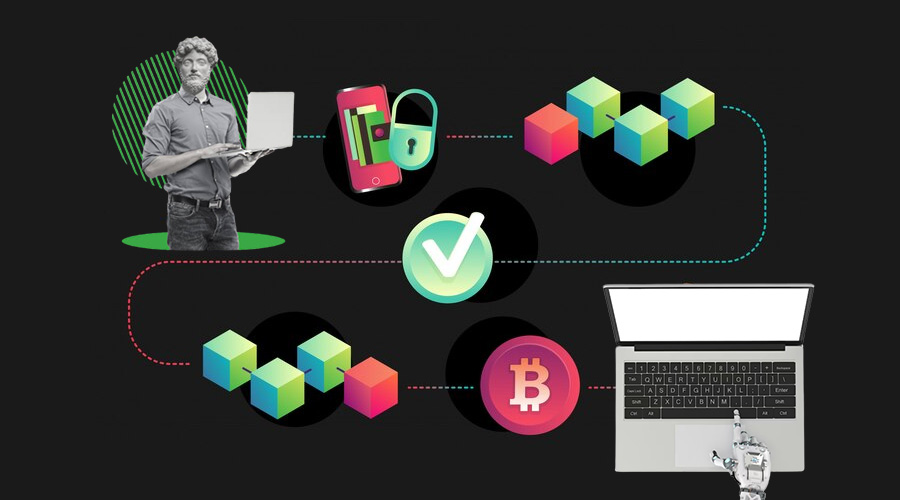 Unlocking the potential of blockchain-powered data exchange in this guide
Unlocking the potential of blockchain-powered data exchange in this guide
In the rapidly evolving landscape of data management and technological innovation, the fusion of blockchain technology with data exchange has given rise to a groundbreaking paradigm – blockchain-powered data exchange.
This comprehensive guide embarks on a journey of exploration through this cutting-edge concept, unraveling its complexities, shedding light on its practical applications, and illuminating its potential to reshape the dynamics of data sharing in the contemporary digital era. From deciphering the fundamental principles of blockchain’s influence to delving into real-world use cases, this guide aims to demystify the intricate world of blockchain-powered data exchange, offering insights that navigate the path toward a more secure, transparent, and interconnected data future.
Understanding Blockchain-powered Data Exchange:
Blockchain-powered data exchange utilizes blockchain technology to facilitate secure, transparent, and efficient data sharing between entities. Unlike traditional centralized data exchange platforms, blockchain-based exchanges leverage the inherent properties of blockchain, such as immutability, decentralization, and cryptographic security, to ensure the integrity and privacy of shared data.
Additionally, blockchain-powered data exchanges employ smart contracts, self-executing contracts with predefined rules and conditions. These smart contracts automate and enforce the terms of data-sharing agreements, reducing the need for intermediaries and enhancing trust between participants. This decentralized nature eliminates the reliance on a single controlling entity, distributing control and decision-making across the network’s participants.
Key Components and Benefits:
Decentralization: Blockchain’s decentralized nature eliminates the need for intermediaries, allowing parties to exchange data directly. This reduces costs, minimizes delays, and enhances trust.
Security and Privacy: Data exchanged on a blockchain is cryptographically secured and tamper-resistant. This enhances data privacy and eliminates the risks associated with centralized data repositories.
Transparency: Every data exchange transaction is recorded on the blockchain, providing an auditable and transparent trail of data transfers. This transparency is crucial for regulatory compliance and building trust.
Smart Contracts: Smart contracts, self-executing code on the blockchain, automate and enforce the terms of data exchange agreements. This streamlines processes and ensures adherence to predefined conditions.
Interoperability: Blockchain-powered data exchange can bridge disparate systems, enabling seamless data sharing between different organizations, industries, and even countries.
Applications in Action:
Imagine a consortium of healthcare providers aiming to improve patient care through shared medical records. Utilizing blockchain-powered data exchange, these providers can securely exchange patient data while ensuring patient consent and integrity. Smart contracts can automate data access requests, ensuring that data is accessed only for authorized purposes. Patients, too, gain control over their data, granting or revoking access based on preferences.
In supply chains, blockchain-powered data exchange can enhance traceability and transparency. Suppliers, manufacturers, and retailers can seamlessly share information about product origins, certifications, and shipping details on an immutable blockchain. This reduces fraud and builds consumer trust in the authenticity of products.
Challenges to Navigate:
While blockchain-powered data exchange holds immense promise, several challenges exist:
Scalability: Ensuring high throughput and low latency on a blockchain network can be challenging, especially when dealing with large volumes of data.
Regulatory Compliance: Different jurisdictions have varying data protection regulations. Ensuring compliance across borders can be complex.
Integration Complexity: Integrating existing systems with blockchain networks requires careful planning and might necessitate changes to legacy processes.
Adoption and Future Outlook:
As organizations recognize the potential of blockchain-powered data exchange, adoption is gaining momentum. Sectors like finance, healthcare, supply chain, and energy are actively exploring their applications. Advancements in blockchain technology, interoperability solutions, and regulatory frameworks are expected to shape the future of blockchain-powered data exchange, enabling secure, transparent, and efficient data sharing across industries.




